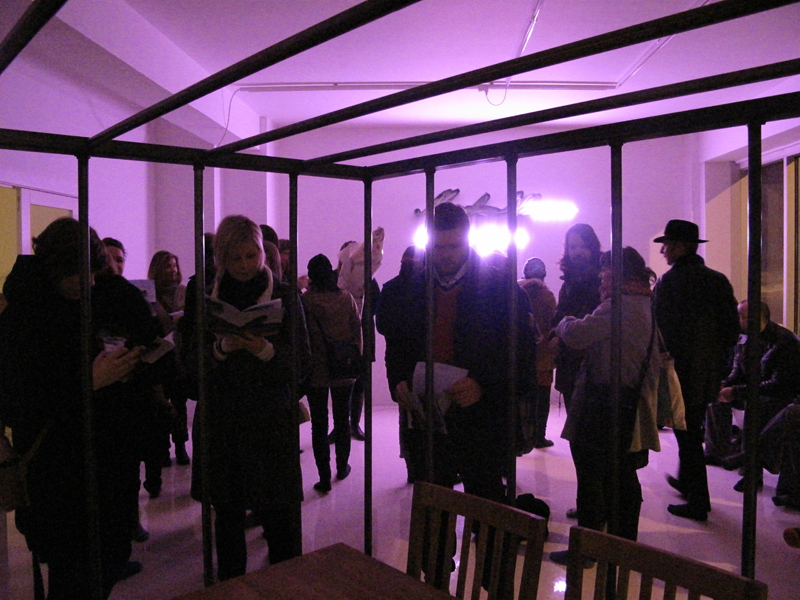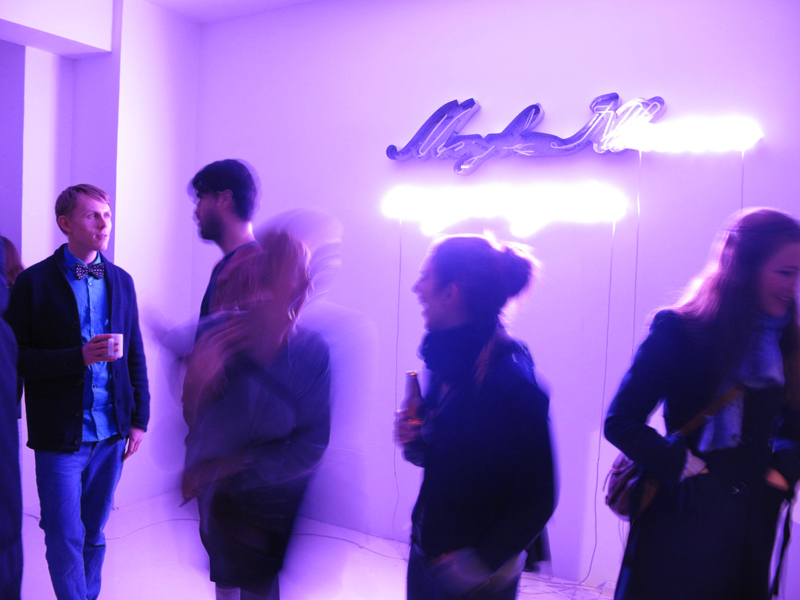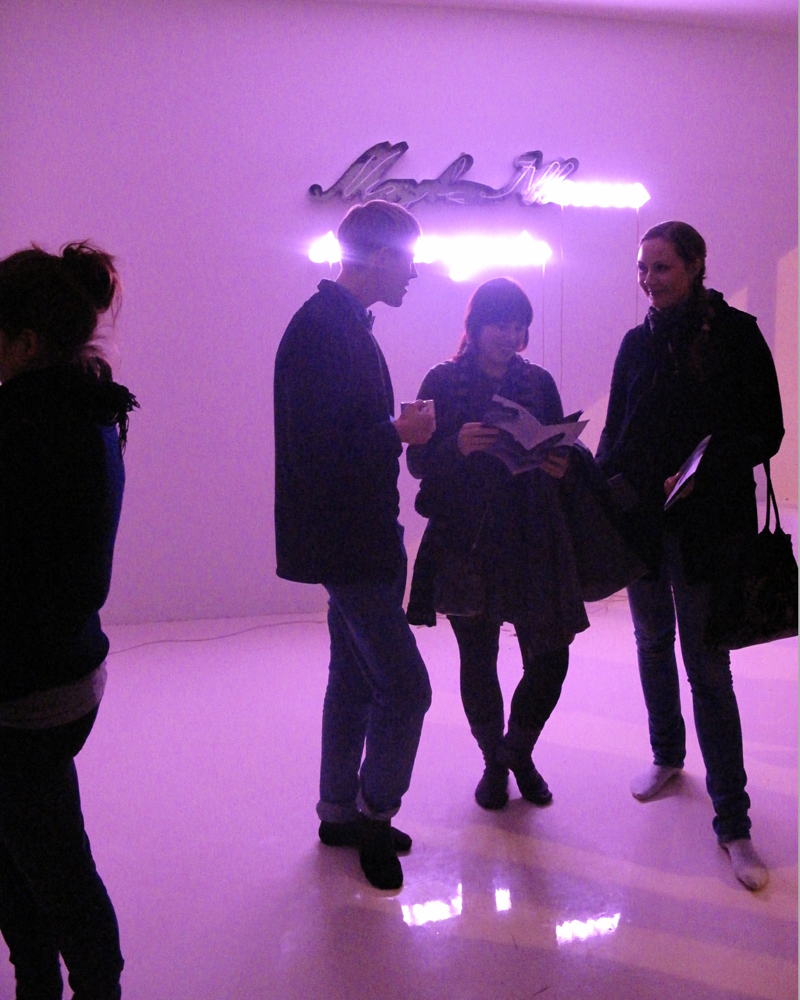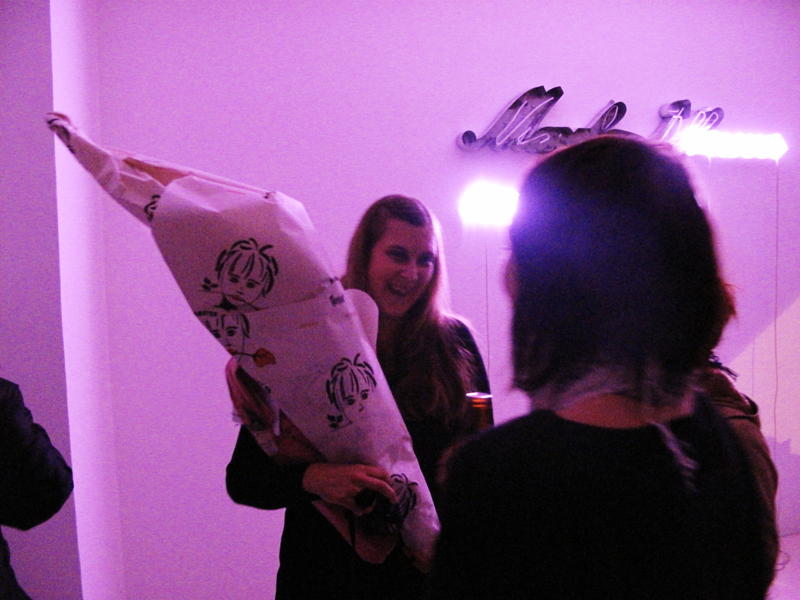Malin Lennström-Örtwall
It`s like Nothing Ever Happened
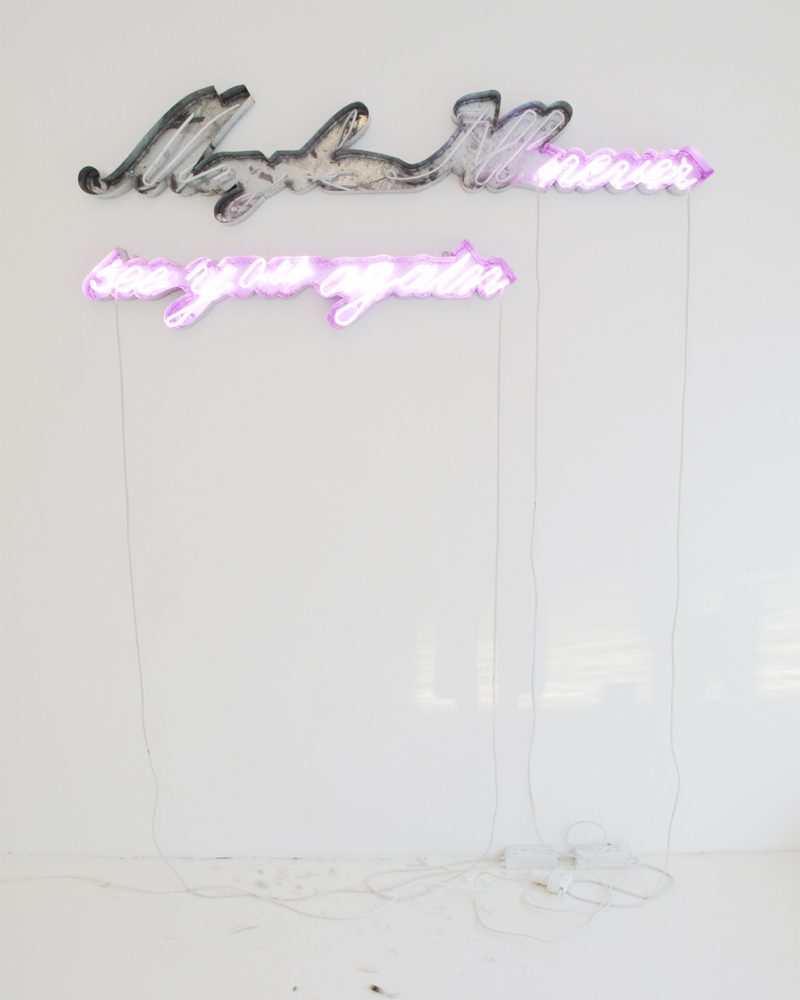
Malin Lennström-Örtwall, Maybe I`ll never see you again. Part 2. Neon sign produced in Palestine and shipped to Norway.
On Thursday the 14 th of January at 19.00 we welcome you to Entrée for the opening of the exhibition: ”It`s like nothing ever happened”, by Malin Lennström-Örtwall. Lennström-Örtwall is an emerging Bergen artist and one of the founders of Bergen Ateliergruppe. The exhibition will consist of a series of installations related to her stay in Palestine in 2008.
Malin Lennström-Örtwall (b. 1976) lives and works in Bergen. She received a BA from Bergen National Academy of the Arts in 2006 and an MA from Trondheim Academy of Fine Art in 2009. She also studied at The International Academy of Art Palestine in Ramallah in 2008. She is one of the founders of Bergen Ateliergruppe (BAG) and the workshop BAG Art Camp. Lennström-Örtwall has exhibited in numerous places such as in Trondheim Kunstmuseum, UKS, Bergen Kunstmuseum, Bonniers Konsthall, Al Mahatta Gallery in Ramallah, Vestlandsutstillingen and Høstsutstillingen. Solo shows include Galleri Mors Mössa in Gotenburg and PASAJist Art Space in Istanbul.
Maybe I’ll Never See You Again
By Tina Sherwell
(Director of the International Academy of Art Palestine)
Malin Lennström-Örtwall came to Palestine to undertake research for her final project, her practice centers around working with objects and re-inventing their meaning through deconstructing their structure or via their relationship with other objects, in which they often take on an unhomely presence and speak of separation and loss.
The piece ‘Maybe I’ll Never See You Again’, explores questions of location, separation, workmanship and the nature of confinement within the Palestinian territories. The phrase itself carries with in undertones of a farewell and a fleeting encounter.
However it also is the reality for many visitors to Israel who are often denied re-entry after visiting the West Bank or Gaza. Malin Lennström-Örtwall herself has also spent many hours being questioned at the border crossings into Israel. So while the phrase carries with it a certain ‘romance’ it also speaks of the confinement and isolation that Palestinians live under in the occupied territories, that manifests itself in regulations of ID cards, checkpoints and the Separation Wall.
In a gesture that attempted to probe the boundaries of the location, Malin decided to create the neon sign in Ramallah using local craftsmanship to execute her piece and then to ship it back to Trondheim, testing the logistics of transporting an object across the borders out of Ramallah and Israel to Norway.
The result of which is what you see in the exhibition, a partial sign, damaged in transit? Deliberately or through negligence? The fragility of the sign becomes a metaphor for the fragility of the reality on the ground and the power of the border authorities. To re-shape and disturb human gestures relations and belonging.
It’s like nothing ever happened
By Maj Hasager
Gaza 5 January 2010: An Israeli air strike has killed one Palestinian militant and injured three others in the Hamas-run Gaza Strip, according to Palestinian and Israeli officials. The death was the first of the Israeli-Palestinian conflict this year. (BBC news 5 January 2010)
Gaza 5 January 2009: The Israeli army says it has hit 40 targets, including several tunnels and the homes of a number of Hamas officials. Hospitals say they are overwhelmed by casualties, mostly civilians including women and children. Ground forces enter the edges of the urban area of Beit Lahiya. (BBC news 5 January 2009)
Bergen/60° 23' 28" N 5° 19' 29" E: While the family is seated around the dinner table with the light from the television flashing in the background, the flow of news pass unnoticed. They talk about events which have happened during this day that is about to turn into night, feeling comfortable and safe in this very moment. Tomorrow is another day filled with work, school or another structure that seem recognisable, and brings certain expectations that are most likely to be fulfilled.
Gaza City/31° 30' 0" N 34° 28' 0" E: Seated in front of the television another family is watching the devastating news that concern them on a personal level. News here is being served as a main course at the table – along with conversations on water shortage, lack of mobility and the uncertainties of the everyday. Still, in an attempt to maintain a familiar structure dinner is served and homework is being discussed, not knowing if the children will make it on time for class tomorrow. The instability within the current situation and the Occupation has seeped through every crack in the walls, and has become ingrained within every individual in the family.
The everyday is political – the unwanted and sudden separation between people remains an unspoken dinner conversation.
Kalandia/31°51’47.21”N 35°12’27.30”E: A bit further north east at the crossing from the West Bank, a woman is standing in a queue. She has walked the same distance several times before, but still feels quite sick when she is queuing up behind the long tail of people suspended between the metal bars that are parting them from the others. They all have their gaze fixed on the turnstile that is supposed to be the ”golden” gate to the other side, a concept she still can’t grasp in her mind. She is almost rubbing against the person in front of her, and to draw the attention to something else than her growing discomfort as the minutes turn into hours in this waiting position – she begins to notice the family in front of her.
The family consists of a father and four children, three boys and a girl in the age 3-12 years. The father is trying to entertain the children as they quickly are getting bored in the uncomfortable situation – waiting to walk through the checkpoint. They play games for a while, which seems to distract the children, and her as well, as they are moving slowly towards the turnstile, which occasionally flashes a green light to let people in for a very short period of time. The father asks the children to keep their place in the queue – as he squirms his way through the sea of people to see why nothing is happening. The children are right behind him in this action, which causes even more discomfort to the people in the crowd, but kindness lets them keep their new and better position. She still watches them, now from a distance as she is pushed further back in the queue. The father manages to shove all four children through the turnstile when the lamp turns green, but unfortunately he is not able to get inside before the lamp turns red.
Now the family is separated by a barrier, and the youngest starts crying. None of the children carry an ID, the soldiers sitting behind bulletproof glass at the checkpoint are not allowing them to pass, and the father is not being let through, which means everyone in the queue is completely stuck. This goes on for a while before something happens, and during this time she meets herself in the darkest corners of her mind – with all the ugliness a human being can contain when forced into a claustrophobic set up. They are all released from the situation as the father finally is let through the turnstile to his children, and more important: the family is let through to the other side.
Before she is allowed to pass, several people are turned back for whatever reason, and with the rejected people moving in the opposite direction through the queue, the composition and order is rearranged over and over.
Maybe she’ll never see them again, but the image of the father diverting the attention of the young ones stays in her mind as she gets back on the bus taking her to the destination of the day. A journey of 17 km has taken her more than three hours. A lot of people face these obstacles every day, and live with the possibility of being denied passage the next time they attempt to cross the checkpoint. She wonders how people maintain their sanity under such extreme and fragile conditions, where the power of the soldiers sets the order of the day.
Gaza 14 January, 2009: Israel's bombardment continues for a 19th day, with overnight air raids on 60 targets, including 35 weapons-smuggling tunnels on the border with Egypt and an unknown number of rocket-launching sites. One air strike damages a cemetery in Gaza City. (BBC News 14 January 2009)
Gaza 14 January 2010: [Please insert news here]
It’s like nothing ever changes.
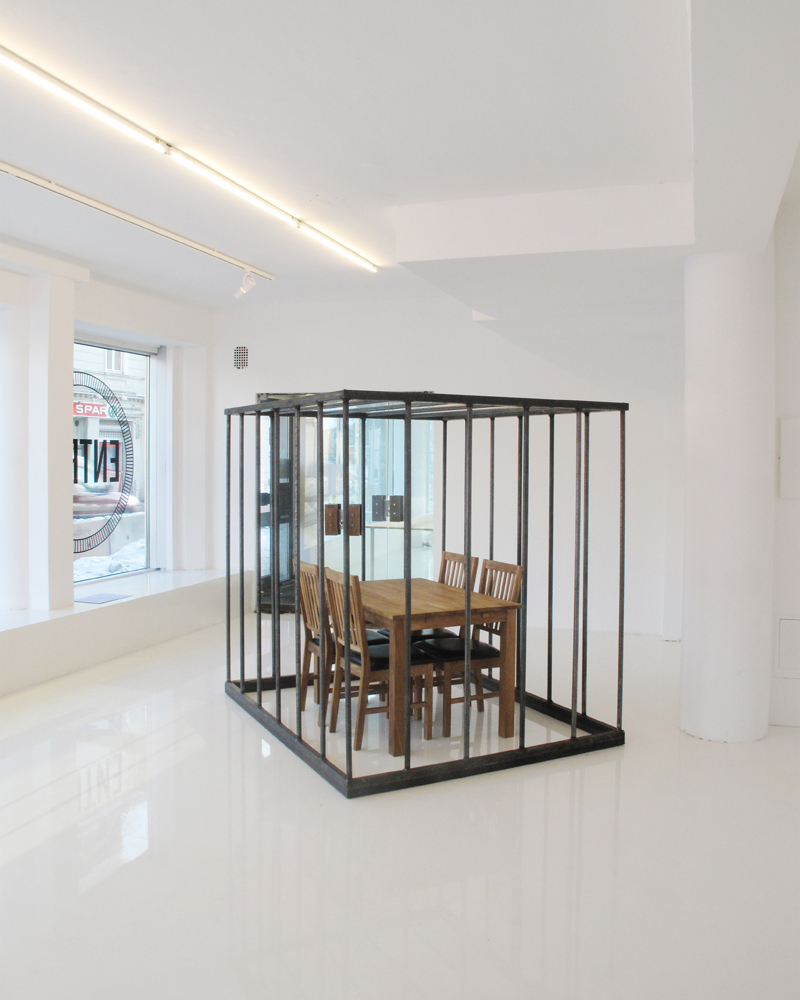
Untitled (Family Table)
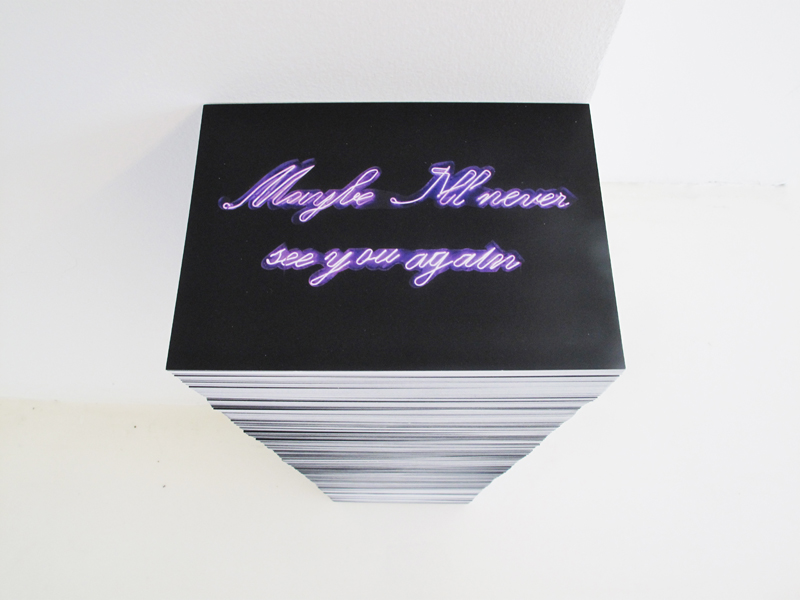
Maybe I`ll never see you agian. Part 1. 1387 postcards produced for the exhibition at Entrée.
